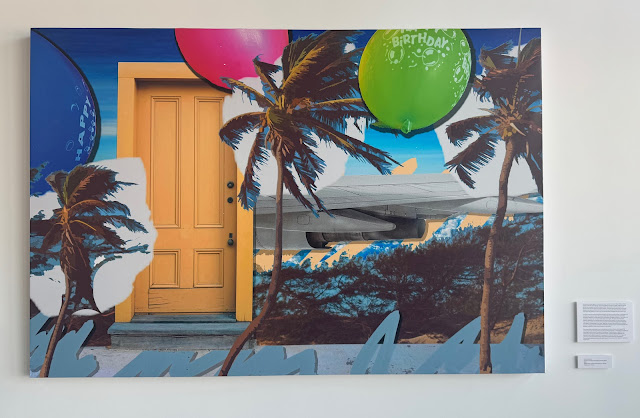Call for Co-Creating the Future: Seeking Collaborative Contributions to Reimagining Critical Digital Performative Pedagogy
Call for Co-Creating the Future: Seeking Collaborative Contributions to Reimagining Critical Digital Performative Pedagogy
For Proposed Focus on Reimagining Critical Digital Performative Pedagogy: Embracing Risk and Technoparticipation in a Post-Pandemic Higher Education Landscape
It's been 5 years since Leap into Action: Critical Performative Pedagogies in Art & Design Education, edited by Dr Lee Campbell. You can read my review of it for Art and the Public Sphere (Journal) here. Today, the theory of critical digital pedagogy remains highly relevant post-2020, particularly due to the global shift to online learning during the COVID-19 pandemic and the emergence of AI technologies. These developments have amplified its importance and introduced new dimensions for consideration.
 Pictured: Leap into Action: Critical Performative Pedagogies in Art and Design Education, Lee Campbell (2020) (ed.) New York: Peter Lang, 290 pp., ISBN 978-1-43316-640-2
Pictured: Leap into Action: Critical Performative Pedagogies in Art and Design Education, Lee Campbell (2020) (ed.) New York: Peter Lang, 290 pp., ISBN 978-1-43316-640-2Key Impacts and Relevance:
- Surveillance and Privacy Concerns: The widespread use of virtual learning tools and AI technologies raises issues of surveillance, data privacy, and the commodification of education.
- Digital Equity: The pandemic exposed disparities in access to technology, and AI risks exacerbating inequalities, emphasising the need for equity and inclusion.
- Human-Centric Learning: AI and digital tools risk reducing education to algorithmic efficiency, underscoring the importance of fostering human connection, creativity, and critical thinking.
- Ethical Implications: AI introduces ethical challenges, such as algorithmic bias and systemic inequalities, requiring critical oversight to ensure fairness and inclusivity.
- Mental Health and Well-Being: Increased screen fatigue and isolation during the pandemic expanded the scope of critical pedagogy to address emotional and psychological impacts, which are further complicated by AI-driven environments.
- Hybrid Learning Models: The rise of hybrid learning environments necessitates rethinking the balance between physical and digital spaces, especially as AI tools become integral to these models.
- AI as a Learning Partner: AI tools can enhance creativity, problem-solving, and adaptive learning environments, but must be used responsibly to shape meaningful learning experiences without undermining originality or student agency.
- Redefining Educator Roles: AI automates administrative tasks, allowing educators to focus on mentoring, fostering critical discussions, and emotional connections.
- Creativity and Interactivity: AI supports creative processes and global collaboration, enabling cross-cultural learning and partnerships, but risks diminishing critical thinking and authenticity in learning.
Challenges and Opportunities:
The pandemic validated the need for flexible and adaptive pedagogical approaches, while AI adds complexity to critical digital pedagogy. Over-reliance on AI risks diminishing critical thinking, and AI-generated content raises questions about authenticity in learning. Educators must critically engage with AI to ensure it enhances relational and creative aspects of education.
The pandemic and the rise of AI have expanded the scope of critical digital pedagogy, emphasising the need for ethical, equitable, and human-centred approaches to technology in education. By addressing issues of equity, privacy, mental health, hybrid learning, and the evolving role of educators, critical digital pedagogy can continue to foster meaningful and transformative educational experiences in an increasingly digital world.
Call to Action for Contributions to the Discussion
We invite scholars, educators, and practitioners to contribute to an exploration of Critical Digital Performative Pedagogy in the context of post-pandemic higher education.
How can we reimagine our approaches by embracing risk and fostering technoparticipation in teaching and learning?
Please submit your innovative research, case studies, reflections, or viewpoints addressing:
- Theoretical and practical frameworks for critical digital pedagogy
- Experiences of risk-taking and experimentation in digital classrooms
- Strategies for meaningful technoparticipation
- Perspectives on the evolving post-pandemic educational landscape
Let's collectively shape the future of higher education! Share your work, insights, and creative practices to contribute to this dynamic conversation.
Please get in touch via here with the subject: 'Reimagining Critical Digital Performative Pedagogy'
My details:
Dr Joshua Y'Barbo
Artist-in-Residence at TEAM LEWIS Foundation
Lecturer in Academic Support at Wimbledon College of the Arts, UAL
Associate Lecturer in Design at Camberwell College of Arts, UAL
https://www.joshuaybarbo.com/
https://joshuaybarbo.blogspot.com/
https://www.instagram.com/ybarbojoshua
https://www.linkedin.com/in/joshuaybarbo/




Comments
Post a Comment